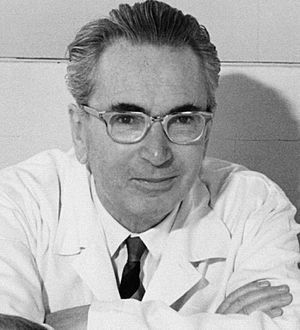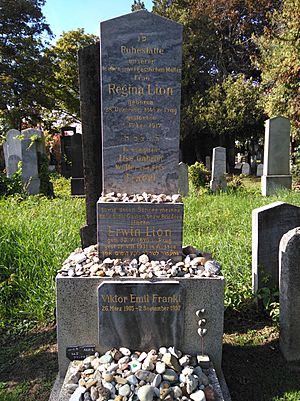Viktor Frankl facts for kids
Quick facts for kids
Viktor Frankl
|
|
|---|---|

Frankl in 1965
|
|
| Born |
Viktor Emil Frankl
26 March 1905 |
| Died | 2 September 1997 (aged 92) Vienna, Austria
|
| Resting place | Zentralfriedhof, Vienna, Austria, Old Jewish Section |
| Nationality | Austrian |
| Alma mater | University of Vienna (MD, 1930; PhD, 1948) |
| Occupation | Neurologist, psychiatrist |
| Known for | Logotherapy Existential analysis |
| Spouse(s) | Tilly Grosser, m. 1941 Eleonore Katharina Schwindt, m. 1947 |
| Children | 1 daughter |
Viktor Emil Frankl (born March 26, 1905 – died September 2, 1997) was an Austrian psychiatrist. He was Jewish and survived the Holocaust. He created a type of therapy called logotherapy. This therapy teaches that finding meaning in life is the most important thing that drives people. Logotherapy is a part of bigger ideas known as existential and humanistic psychology.
Logotherapy became known as the third main type of psychotherapy from Vienna. The first two were started by famous thinkers Sigmund Freud and Alfred Adler.
Frankl wrote 39 books. His most famous book, Man's Search for Meaning, shares his experiences from several Nazi concentration camps. This book became a bestseller around the world.
Contents
Early Life and Ideas
Viktor Frankl was born in Vienna, Austria. He was the middle of three children in a Jewish family. His father worked for the government. Viktor became interested in psychology and the idea of "meaning" very early. He took night classes on applied psychology when he was still in junior high school.
As a teenager, he even wrote letters to Sigmund Freud, a very famous psychologist. He asked Freud for permission to publish one of his early papers. After finishing high school in 1923, Frankl went to the University of Vienna to study medicine.
In 1924, Frankl's first scientific paper was published. It appeared in The International Journal of Psychoanalysis. Around the same time, he led a youth movement for high school students. His father was a socialist and named Viktor after a party founder. During this period, Frankl started to question some of Freud's ideas.
He then joined the group of students around Alfred Adler, another important psychologist. In 1925, Frankl published his second paper in Adler's journal. However, Frankl believed that finding meaning was the main thing that motivated people. Because of this strong belief, he was later asked to leave Adler's group. From 1926, he began to develop his own ideas, which he called logotherapy.
His Career and Experiences
Working as a Psychiatrist
In 1937, Viktor Frankl started his own private practice. But when the Nazis took over Austria in 1938, it became very hard for him to treat patients. In 1940, he became the head of the neurology department at Rothschild Hospital. This was the only hospital in Vienna that still accepted Jewish patients. Before he was sent to concentration camps, Frankl helped many patients. He protected them from a Nazi program that targeted people with mental disabilities.
In 1942, just nine months after he got married, Frankl and his family were sent to the Theresienstadt concentration camp. His father died there from hunger and illness. In 1944, Frankl and the rest of his family who were still alive were moved to Auschwitz. There, his mother and brother were killed in gas chambers. His wife later died from a disease called typhus in Bergen-Belsen. Frankl spent three years surviving in four different concentration camps.
After the war ended, Frankl became the head of the neurology department at the Vienna Polyclinic Hospital. He also opened a private practice at his home. He continued to work with patients until he retired in 1970.
In 1948, Frankl earned a PhD in philosophy from the University of Vienna. His special paper, called The Unconscious God, looked at how psychology and religion are connected. He suggested using a method called Socratic dialogue to help people discover their deeper spiritual thoughts.
In 1955, Frankl became a professor of neurology and psychiatry at the University of Vienna. He also taught as a visiting professor at famous universities in the United States, like Harvard University (in 1961) and Duquesne University (in 1972).
Throughout his career, Frankl believed that some early types of therapy made patients feel less human. He argued that therapy should focus on making people feel more human again.
In 1985, the American Psychiatric Association gave Frankl the Oskar Pfister Award. This award recognized his important contributions to both religion and psychiatry.
Man's Search for Meaning
While he was head of the Neurological Department, Frankl wrote his famous book, Man's Search for Meaning. He wrote it in just nine days. The book was first called A Psychologist Experiences the Concentration Camp. It was published in German in 1946. The English version came out in 1959 and quickly became a huge international bestseller.
Frankl thought the book's success showed a "mass neurosis of modern times." He felt that many people were searching for meaning in their lives, and his book offered a way to think about it. Millions of copies were sold in many different languages. In a 1991 survey, Man's Search for Meaning was named one of the ten most important books in the United States.
Awards and Honors
- 1956: Promotion Award for Public Education, Austria
- 1962: Cardinal Innitzer Prize, Austria
- 1969: Austrian Cross of Honour for Science and Art, 1st class
- 1976: Prize of the Danubia Foundation
- 1980: Honorary Ring of Vienna, Austria
- 1981: Austrian Decoration for Science and Art
- 1985: Oskar Pfister Award, US
- 1986: Honorary doctorate from the University of Vienna, Austria
- 1986: Honorary member of the association Bürgervereinigung Landsberg im 20. Jahrhundert
- 1988: Great Silver Medal with Star for Services to the Republic of Austria
- 1995: Hans Prinzhorn Medal
- 1995: Honorary Citizen of the City of Vienna
- 1995: Great Gold Medal with Star for Services to the Republic of Austria
Personal Life
In 1941, Frankl married Tilly Grosser. She was a nurse at Rothschild Hospital. Soon after they married, she became pregnant. However, due to the terrible conditions and Nazi policies, they were forced to end their pregnancy. Tilly later died in the Bergen-Belsen concentration camp.
Frankl's father, Gabriel, died in the Theresienstadt Ghetto concentration camp in 1943. He was 81 and died from hunger and pneumonia. His mother and brother, Walter, were both killed in Auschwitz. His sister, Stella, was able to escape to Australia.
In 1947, Frankl married Eleonore "Elly" Katharina Schwindt. She was Catholic. They respected each other's religious beliefs. They went to both church and synagogue and celebrated both Christmas and Hanukkah. They had one daughter, Gabriele, who grew up to become a child psychologist. After Frankl's death, his wife and son-in-law shared that he prayed every day and knew many Jewish prayers and psalms by heart.
Viktor Frankl died of heart failure in Vienna on September 2, 1997. He is buried in the Jewish section of the Vienna Central Cemetery.
See also
 In Spanish: Viktor Frankl para niños
In Spanish: Viktor Frankl para niños
- List of logotherapy institutes, many named after Frankl
- Meaning-making
 | Selma Burke |
 | Pauline Powell Burns |
 | Frederick J. Brown |
 | Robert Blackburn |


